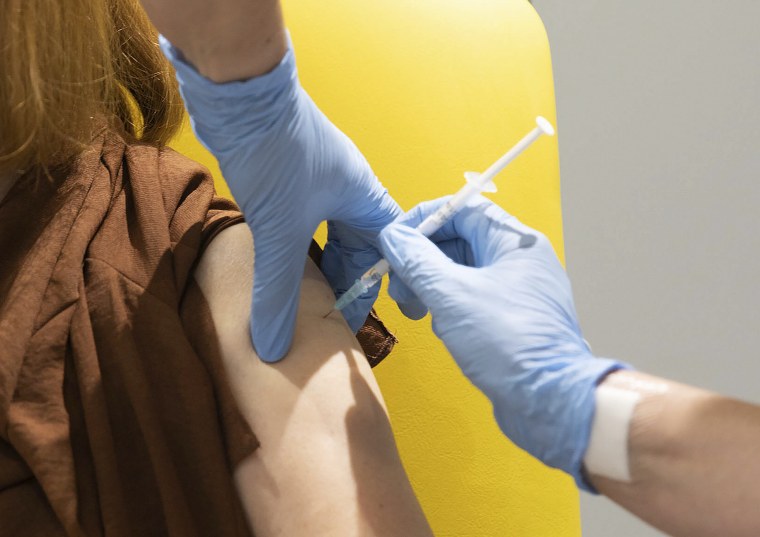LONDON — After one historic Covid-19 first, a second more subtle pandemic milestone was reached in Britain on Tuesday.
A vaccine front-runner developed by Oxford University and AstraZeneca became the first to have its Phase 3 clinical trial results published in a peer-reviewed journal, the Lancet medical journal, which confirmed the initial findings that the shots have an average effectiveness of 70.4 percent.
There were no hospitalizations or cases of severe Covid-19 three weeks after the first dose taken by around 11,600 volunteers in the U.K. and Brazil, it said.
Peer-reviewed data is something that experts have been desperate to see, given most of the positive Covid-19 vaccine news has been communicated in press releases.
"This is probably the best day we've had in 2020," Oxford University's professor Sarah Gilbert told reporters via conference call before the results were officially announced. She was referring to her team's positive news coming hours after another vaccine, made by BioNTech-Pfizer, was rolled out in the U.K. "We now see our vaccine is safe and it is highly effective."
However, questions continue to swirl around the Oxford-AstraZeneca vaccine, which has endured a troubled few weeks.
The partnership released results from its Phase 3 trial last month, including one surprising detail: Some trial volunteers received a lower first dose of the vaccine, but appeared to have a higher protection — 90 percent — against symptomatic Covid-19.
Volunteers who received standard double-dose regimen received around 62 percent protection, it said. Combining the two gave the average of around 70 percent.
Questions turned to concern after it emerged this lower dose was administered by mistake — something the officials and scientists failed to mention at all when presenting their findings. This sent AstraZeneca's shares plummeting and prompted its chief executive, Pascal Soriot, to say there would be additional tests to clear up the confusion.
Download the NBC News app for the latest news on the coronavirus
The U.S. federal government has pre-ordered 300 million doses of the Oxford-AstraZeneca vaccine and pledged up to $1.2 billion to support its research and development.
But Soriot said that he believes the U.K.-Brazil trial would not be enough to satisfy regulators at the U.S. Food and Drug Administration, which he believes want to wait for the completion of a separate U.S.-based trial before making a decision.
Moncef Slaoui, chief scientific adviser to the White House's Operation Warp Speed, appeared to confirm that speaking with reporters last week.
"Frankly, unless there is a very clear explanation based on facts and data for what’s behind those two numbers, it's very likely that that package would not be sufficient for an approval — I’ll be the first one to say it," he said, according to Reuters.
A call with journalists ahead of the announcement Tuesday was dominated by questions about the discrepancy between doses. The paper in the Lancet said "there is a possibility that chance might play a part in such divergent results."
And professor Andrew Pollard, head of the Oxford Vaccine group, conceded that "it's fair to say that it needs looking into to explain the intriguing result."
There are also questions about how effective these shots will be for older people. Of the 11,600 volunteers assessed in Tuesday's study, just 12 percent were over the age of 55.
"The vaccine efficacy in older age groups could not be assessed but will be determined in future analyses after more cases have accrued in this age range," Oxford University said in a statement.

